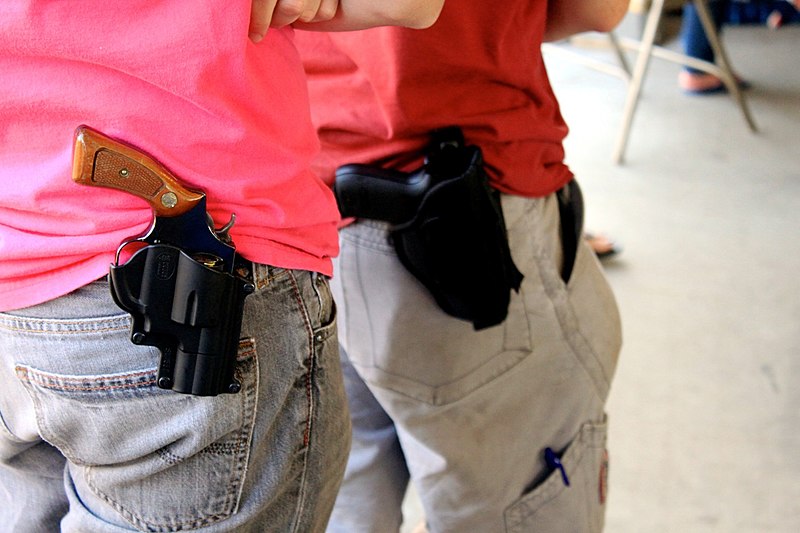Last Updated: May 15, 2021
Disclaimer: While the information provided here is legal in nature, it is not to be construed as legal advice, and is for educational and entertainment purposes only
With the amount of gun laws constantly being proposed and changed at the federal and state levels, it can get confusing trying to keep track of the ones that affect you and your gun rights.
Washington state doesn’t help make things easier with its own gun laws, especially its strict stance when it comes to handguns.
Fortunately, we’ve got everything you need to know to navigate the tortuous gun laws of Washington and have you out protecting your freedoms in no time!
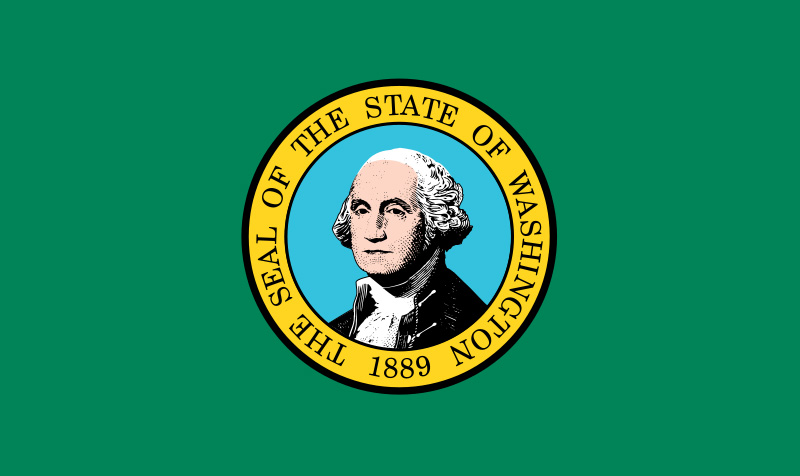
Buying a handgun
The process for buying a handgun in the Evergreen State is relatively involved, so you may want to sit down.
To buy a handgun, you must:
- Be 21 or older;
- Provide state ID; and
- Have a background check performed by a licensed firearms dealer.
To start the buying process, you have to fill out an application (in triplicate!) that requires your personal information, as well as a description of the gun, including the make, model, caliber, and serial number.
The application also acts as a waiver of confidentiality and allows healthcare facilities to release information about your mental and physical health in order to evaluate your eligibility to purchase a firearm.
Once you’ve filled that out, you can proceed to the background check portion.
The background check, unlike other states around the country, cannot be avoided, even if the transaction is with a private seller instead of a licensed firearms dealer. Any private transfers of firearms have to be completed through a licensed dealer.
Even those with concealed pistol permits (CPLs) who were previously able to provide their CPL and skip the background check now have to go through the entire process like everyone else.
Taking it out for a spin
The state defines “transfers” of firearms as more than just a transaction that changes ownership of the gun. Even loaning your pistol to a friend or other temporary changes in possession of the firearm requires a licensed firearms dealer to perform a background check before you can proceed.
There are exceptions, however, to the “transfer” definition. If any of the exceptions apply, then you do not need to have a background check performed by a licensed firearms dealer before passing off the handgun to another person.
Exceptions to the transfer rule include:
- Transfers and sales of antique firearms;
- Gifts (not sales) between immediate family members;
- Temporary transfers between spouses or domestic partners;
- Transfers to and back from a federally licensed gunsmith for the purposes of service or repair;
- Temporary transfers of firearms at an established shooting range, only if the firearm is kept at the range at all times; and
- Transferring firearms while hunting, if the transfer is made only in locations where hunting is permitted, and the person receiving the firearm is licensed to hunt.
To be considered an antique firearm, and qualify for an the background check exception, the firearm must:
- Not be intended or redesigned for using rimfire or centerfire ignition with fixed ammunition, and be manufactured before 1899; or
- Be manufactured before 1899, and use ammunition that is no longer manufactured in the United States, and is not readily available through ordinary commercial channels (i.e. can’t just buy ammo from your local Walmart).
If the handgun you plan on purchasing meets either of those situations, you can avoid the background check, and make the purchase like any other non-firearms related item.
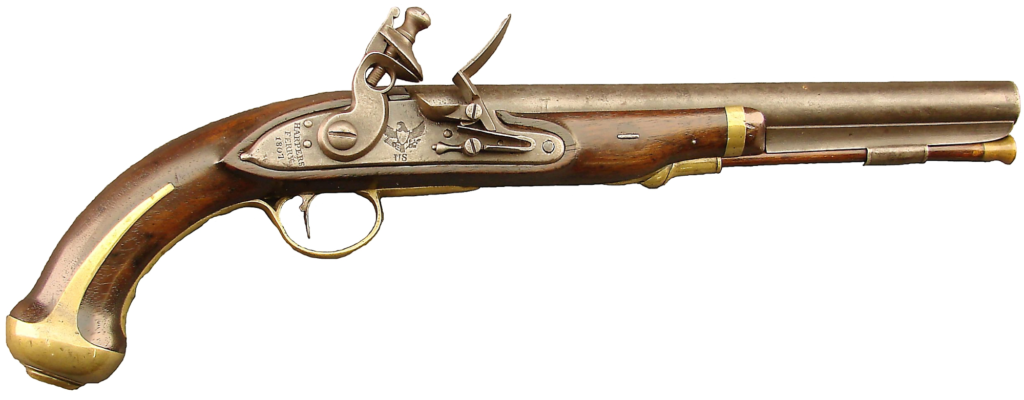
In the background
Even if you don’t fall into any of the categories to skip the background check, there’s still a way you can get around it.
If you can get the approval of your local Chief of Police or Sheriff, you can avoid the background check. At that point though, it may be easier to just suffer through the background check like the rest of us.
The background check itself could take a few days, but either way, you’ll need to wait 10 days before you can claim your handgun from firearms jail.
The state is pretty strict about who they let purchase handguns, however, so you will need to either make the purchase with a state ID, or provide evidence you have been a Washington resident for the past consecutive 90 days before the purchase.
Otherwise, you may have to wait up to 60 days before you can pick up your firearm, instead of the standard 10 days.
On top of all that time waiting, if the police have any reasonable grounds to suspect you are ineligible for a handgun, the purchase can be put on a 30-day hold, which can be extended by additional 30-day periods by the court.
But wait!
Even once you’ve managed to meet all those requirements and go through the background check, there are still situations that would prohibit you from owning a firearm.
You are prohibited from owning (and purchasing) firearms if you:
- Have been convicted of a crime punishable by imprisonment for over a year;
- Are a fugitive from justice;
- Illegally abuse controlled substances;
- Have been adjudicated as mentally defective of incompetent, or have been committed to a mental institution;
- Are an illegal alien;
- Are a former US citizen who has renounced his citizenship;
- Were dishonorably discharged from the US Armed Forces;
- Are subject to a restraining order from harassing, stalking, or threatening an intimate partner or child of the intimate partner; or
- Were convicted of a misdemeanor crime of domestic violence.
In addition to these federal restrictions, the state of Washington also has its own set of prohibitions, including prohibiting you from owning and purchasing firearms if you:
- Have been convicted or found not guilty by reason of insanity of any of the following crimes committed by one family or household member against another: assault in the 4th degree, coercion, stalking, reckless endangerment, criminal trespass in the 1st degree, or violation of the provisions of a protection order or no-contact order restraining the person or the person from a residence; or
- Have been convicted or found not guilty by reason of insanity of harassment when committed by one family or household member against another.
It’s quite a list, so you’ll want to go through it carefully. As long as none of those situations apply to you, you’re good to go!
A “serious offense” typically involves any crime of violence or sex-related crimes. If you are wondering what specifically qualifies as a serious offense and if your criminal history would prevent you from owning a firearm, the general rule is that if you have to ask, you most likely do not qualify.
Of course, you can always check with your local police department just to be sure.
Bonus round!
As an added bonus, Washington’s recently updated “red flag” laws now also allow for law enforcement to take away your firearms and prevent you from accessing any if an “extreme risk protection order” (ERPO) is issued.
There has always been a “red flag” law on the books, but it previously was limited to situations where you were at risk of causing harm to yourself or others, including causing danger as a result of a mental health crisis or violent behavior.
With the updated laws, a family or household member, or any law enforcement officer, may file for an ERPO against you based on threatening or violent behavior.
So what does that mean?
Setting aside the issue of whether red flag laws violate the Second Amendment in the first place, you no longer need to be off your rocker for the red flag law to be used against you, as long as you are deemed to have “threatening” behavior.
Threatening behavior gives a lot of room for interpretation, so it’s a little tricky and a bit of a slippery slope.
Obviously, someone posting about how they want to harm the bullies at school would be worth looking into. But, it’s much tougher to make a call when a teenager is just upset at a bad grade, or a coworker complains to people about being passed up for a promotion and says something in the heat of the moment that they may not really mean.
With the new “threatening behavior” requirement of the red flag law, there may be instances where an ERPO is issued against someone just blowing off steam, with no intention, or even thought, of harming anyone, with a firearm or otherwise.
It may take a flagrantly abusive use of an ERPO and a subsequent lawsuit to really narrow the law to be more in line with what it was before, focusing on those with mental health issues or violent behaviors.
Or better yet, bring a lawsuit against the growing number of red flag laws springing up around the country.
For now, you’ll just have to hope no one considers anything you say or do to be “threatening behavior”, or you may find yourself on the receiving end of an ERPO, with not just purchase and ownership of firearms prohibited, but even access to them being restricted as well.
Don’t forget about long guns!
After going through that obstacle course in getting a handgun, the good news is that there is no additional requirements you’ll need to know in order to buy a long gun.
There is no license or permit required to purchase a long gun in Washington. In fact, local governments are actually prohibited by law from requiring purchase permits! That doesn’t mean there are no requirements at all, of course.
To buy a long gun, you must:
- Be 21 or older;
- Provide ID; and
- Have a background check performed by a licensed firearms dealer.
Just like with handguns, unfortunately, background checks are required, even for private sales.
The same exceptions also apply in avoiding the background check, as well as the situations that would prohibit you from owning and purchasing firearms.
The same exceptions for handguns also apply here in avoiding the background check, as well as the situations that would prohibit you from owning and purchasing firearms.
What’s more, however, with rifles, the firearms dealer can’t actually give you the rifle after the 10 day waiting period until you sign a statement stating you have completed a firearms safety training program within the last 5 years of the purchase date.
The safety training program has to at a minimum, include instructions on:
- Basic firearms safety rules;
- Firearms and children, including secure gun storage and talking to children about gun safety;
- Firearms and suicide prevention;
- Secure gun storage to prevent unauthorized access and use;
- Safe handling of firearms; and
- State and federal firearms laws, including prohibited firearms transfers.
Fortunately, any legitimate program will include all of this information, so you should be good to go. And no, reading articles on this site doesn’t count as a safety program (though it should).
What about assault rifles??
What the heck is an assault rifle, and how do you get one?
Well, according to the state of Washington, the beloved AR-15 is a “semiautomatic assault rifle” so you’ve actually had one all along!
Legally, a “semiautomatic assault rifle” is any rifle that utilizes a portion of the energy of a firing cartridge to extract the fired cartridge case and chamber the next round, and requires a separate pull of the trigger to fire each cartridge.
A rifle is NOT a “semiautomatic assault rifle” if it is an antique firearm, any firearm made permanently inoperable or is manually operated by bolt, pump, lever, or slide action.
So basically, just a semiautomatic rifle. The word “assault” is essentially meaningless and does not carry any of the crazy restrictions or requirements you’ll find in states like California.
But hey, “semiautomatic assault rifle” sounds scary. So there.
Just don’t use it with your fully semiautomatic 30-clip magazine. See? I can make up random nonsense too.
What about the children???
Since July 2019, the previous laws allowing for rifle ownership and possession when you turn 18 were thrown out the window.
You now have to be at least 21 to buy or even possess (i.e. hold in your hands, have in your house, etc.) a firearm.
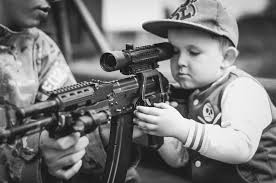
All’s not lost, however. The exceptions to the age requirement were still kept in place, thankfully.
If you are 21 or younger, you can possess and use firearms if you are:
- On duty as a member of the US Armed Forces, National Guard, or reserves;
- Attending a hunter’s safety course or firearms safety course;
- Practicing at an established shooting range (your backyard does not count);
- Participating in an organized competition or performance that involves firearms use;
- Hunting or trapping (with a valid license);
- In an area where shooting is permitted, and you are:
- At least 14 years old;
- Have been issued a hunter’s safety certificate; and
- Are using a long gun.
- Using firearms while under the supervision of a parent, guardian, or adult who is approved by a parent or guardian;
- Traveling with an unloaded firearm to/from any of the situations above; or
- Are on your own property or property controlled by a parent, relative, or legal guardian, and have the permission of a parent or legal guardian to have and use the gun.
- At home; or
- At your fixed place of business (a store that you work at, as opposed to a food truck).
The list should cover most situations where you would want to have a firearm, though you won’t be able to walk around town carrying a gun.
Still, it could be worse, and you could live in California or New York, so look on the bright side!
So be nice to your parents and maybe they’ll let you go practicing at the range and carry around the house!
Bump in the night
For our friends in the state of Washington, there was a brief period of awesomeness when bump stocks, officially called “bump-fire stocks”, were legal, and you could have what was effectively a fully-automatic rifle.
The state legislature had to rain on the parade, however.
If you were one of the lucky ones who managed to get your hands on a bump stock and took it out to the range for a couple Sunday Gundays, you hopefully have some footage of those trips to relive the memories.
In response to the excitement of bump-fire stocks a while back, Washington state decided to designate the firearms accessory contraband.
This made ownership, possession, manufacture, and basically anything remotely related to a bump stock, illegal.
There was even a buy-back program put in place to allow people who legally obtained the bump stocks to be able to turn them in and be compensated for their now-illegal fun sticks. It wasn’t much, but it was something.
As of now, all bump-fire stocks, and anything remotely related to them, are illegal in Washington.
I ain’t afraid of no ghost (guns)
Not satisfied with just making bump stocks illegal, the WA legislature also decided the state needed to try and keep up with other states like California to address the manufacture and use of “ghost guns.”
Ghost guns, for those wondering, are just firearms without serial numbers.
Typically when someone decides to make their own firearms, there isn’t really a point in putting a serial number on them, since the goal is just to have a fun new range toy, rather than having any kind of identifying information.
That, and it’s an unnecessary extra step to engrave or etch a serial number as part of the gun-making process.
The ghost gun laws in Washington, fortunately, are aimed at preventing the illegal manufacture of firearms, rather than firearms enthusiasts interested in putting together their own guns.

The State went one step further, however, and also made it illegal to make/own/look at “undetectable” firearms.
These firearms are any that are not as detectable as 3.7-ounces of 17-4 PH stainless steel by airport metal detectors, or any firearm where the parts, such as the barrel or receiver, would not generate an image that accurately depicts the shape of the part when examined by airport x-ray machines.
Basically, any small firearm that is less than the 3.7-ounces stainless steel requirement, or has parts that somehow trick x-ray machines, is considered “undetectable”, and is illegal to have, and of course, illegal to make.
Ghost guns, or “untraceable” firearms, on the other hand, only apply to firearms made after July 1, 2019, and is basically any firearm that is not an antique and does not have a serial number put on it by an FFL manufacturer or importer.
While an undetectable firearm is illegal in general, an untraceable firearm is only illegal if it is made with the intent to sell it. If you decide to machine your own parts and put together a rifle, as long as you do not intend to sell the gun, but are just making it for personal use, it would be perfectly legal under Washington law.
Of course, if you try to get cute with the law and say you didn’t intend to sell the untraceable firearm when you made it, but then a week later, changed your mind and decided to sell it, you’re welcome to try your luck and see what happens.
Don’t call me when you’re put in jail though. I’ll be busy.
Have gun, will carry
Once you’ve jumped through all the hoops of the gun buying process, you’ll probably want to show off your shiny new toy. This is where things get tricky, though.
Washington state does not officially have any laws prohibiting open carry of firearms. However, there is a law that prohibits carrying, exhibiting, displaying, or drawing firearms in a way that seems like you have an intent to intimidate someone else, or that causes someone to be alarmed for the safety of others.
There are also specific situations where carrying is not allowed.
Depending on where you are and the people around you, the sight of your otherwise legal open carry firearm may cause some people to be alarmed for their safety and the safety of others. In that situation, under Washington law, your open carry would be considered illegal. Unfortunately, it’s up to you to gauge your surroundings and decide how your display of American freedom will be received by others.
In plain sight
Another option to avoid the open carry problem would be to carry concealed. Carrying concealed, however, is much easier said than done. A concealed carry permit is required in order to carry concealed handguns in Washington. There are no permits for carrying concealed long guns, because awkward trench coats are usually dead giveaways for people trying to hide their long guns.
You do not need a concealed carry permit to carry a concealed handgun in your home or in your place of business, however. You’ll just need to remember to open carry when you head out to lunch, or lock it away in your gun safe until you get back to the office (or get back home).
For those of you interested in getting a concealed carry permit in Washington, hop on over to our Washington CCW Laws section to get the lowdown on the application process and the additional laws you’ll need to keep in mind when carrying concealed.
Off limits
Regardless of whether or not you have a concealed carry permit, there are certain places in the state where firearms are prohibited for everyone.
Firearms are not permitted:
- On elementary or secondary school property;
- On school-provide transportation or areas of facilities being used exclusively by schools
- In restricted-access areas of a jail;
- In courthouses;
- In restricted areas of a mental health facility;
- In areas of restaurants that are off-limits to people under 21 (usually the bar); and
- In restricted areas of commercial airports.
New laws limiting open carry were added to the mix in 2021.
It is now illegal to openly carry a firearm if you are within 250-feet of a “permitted demonstration” in a public place. What’s more, is that the law applies if you are actually openly carrying on your body, or even just have it inside your car.
Even if you leave your firearm locked in the trunk of your car, it is considered “open carry” under the newly enacted law. So basically you can’t drive, let alone park within 250-feet of a permitted public demonstration. Hope there’s a Waze setting for that.
It’s important to keep in mind, too, that while many places in Washington may have signs that say “no firearms allowed” or “firearms prohibited” hanging on the window, these signs have no legal effect. You’ll probably still be hassled by the storeowners if you decide to bring your firearms in any way, which is a different issue you’ll have to deal with. It’s probably a better idea to just support stores that actually welcome you and your freedom pals anyway.
And because it’s Washington, there is a specific law that prohibits carrying of firearms while on the site of an outdoor music festival!

Truckin’ along
Aside from carrying while on foot, you’ll also be transporting your firearms in vehicles at some point.
Unless you have a concealed carry license, you must transport all handguns unloaded. Even when you leave the vehicle, the pistol has to be unloaded and must be locked in the vehicle and concealed from view. Basically, you can have unloaded handguns in the car, and stowed away in a gun safe while you’re away from the vehicle.
Long guns must also be unloaded when being transported. Because of the way they are loaded, however, long guns specifically cannot contain shells or cartridges in the magazine or chamber, and muzzle-loaded firearms cannot be loaded and capped or primed.
What this essentially means is that any time you take your guns into the car with you, you’ll want to make sure they are unloaded and have no ammo anywhere near the magazines or chamber. You can have ammo close by, but the firearms themselves must remain unloaded.
Stick to your guns
Aside from being fun range toys, firearms are also pretty good at defending your life and liberty. Fortunately, in Washington, there are laws allowing for the use of deadly force in self-defense situations.
Defending the castle
Under what is commonly known as the “Castle Doctrine,” you are permitted to use deadly force if you reasonably believe it is necessary to prevent a felony or great personal injury to yourself or someone else nearby.
This typically means defending yourself or others when someone breaks into your home or your apartment. Rushing to defend someone who is being attacked in the apartment next door, while admirable, would likely not be considered self-defense. If your neighbor ran into your apartment, however, that would be a different story.
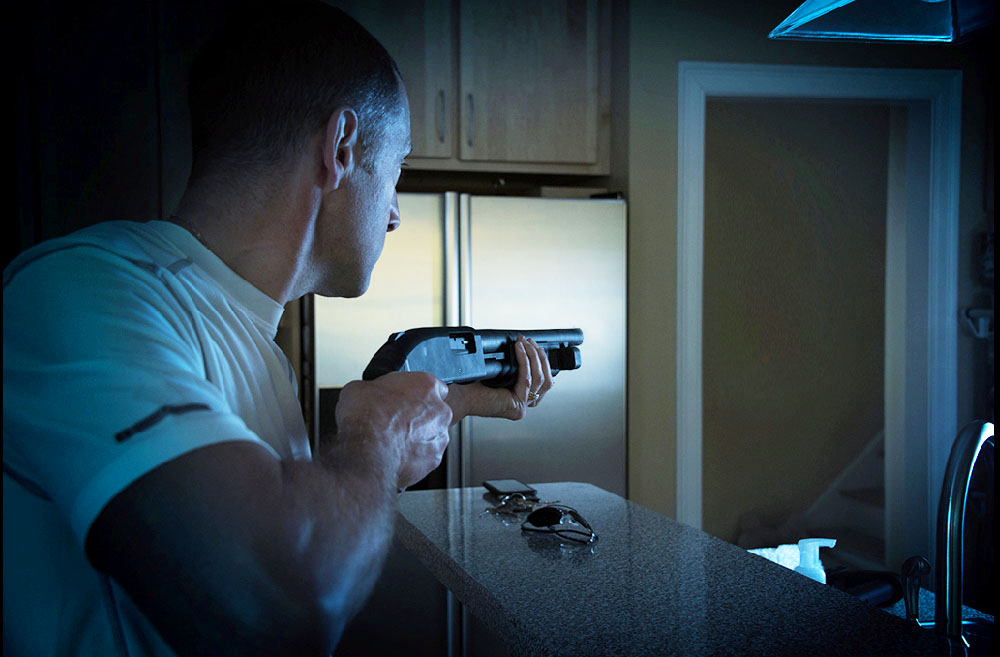
Standing your ground
Aside from defending yourself and others while at home, you are also allowed to defend yourself outside the home. Washington does not have any laws that require you to retreat when faced with a threat of felony or great personal injury when you are not at home. However, it is more difficult to convince a jury that deadly force was necessary in a situation where you could have escaped to safety instead.
Of course, if you cannot retreat without risking harm to yourself and are backed into a corner, then you should use whatever force is necessary to end that threat to yourself and others around you. No matter what situation you ultimately find yourself in, you should always use your best judgment to decide what type of force is appropriate.
One last thing
With that, you’ve now got all the information you need to be a responsible gun owner in the great state of the great state of Washington! Well, almost.
With the new group of firearms laws in 2019, a new law has been passed regarding storage of firearms. Depending on what is done with your firearm if it is accessed without your permission and how it was stored in the first place, you may be guilty of “community endangerment,” or even a felony!
Luckily, it doesn’t take much to avoid being hassled by the new law and keep the nanny state off your back.
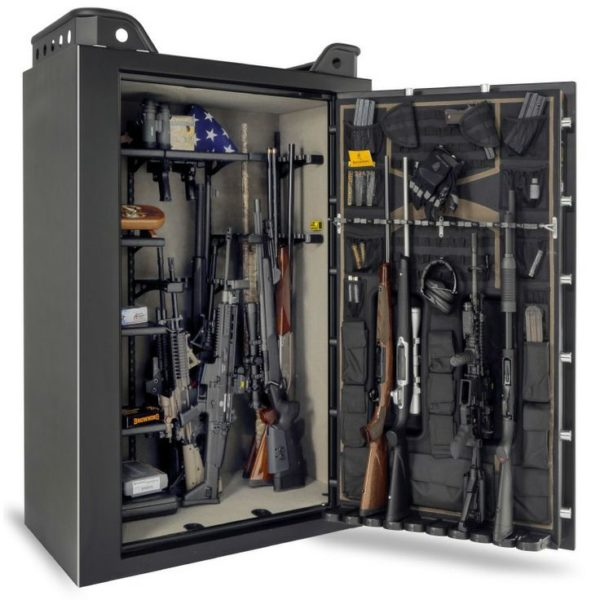
As long as you store your firearms in a secure gun storage option or secure your firearms with a trigger lock-type device to prevent unauthorized use or discharge of the firearm, you’ll be good to go.
You’ll have to get used to not leaving your guns laying around the house where anyone can grab one off the table and run off with it, but maybe it’s a good idea to keep them locked up so they don’t get stolen in the first place.
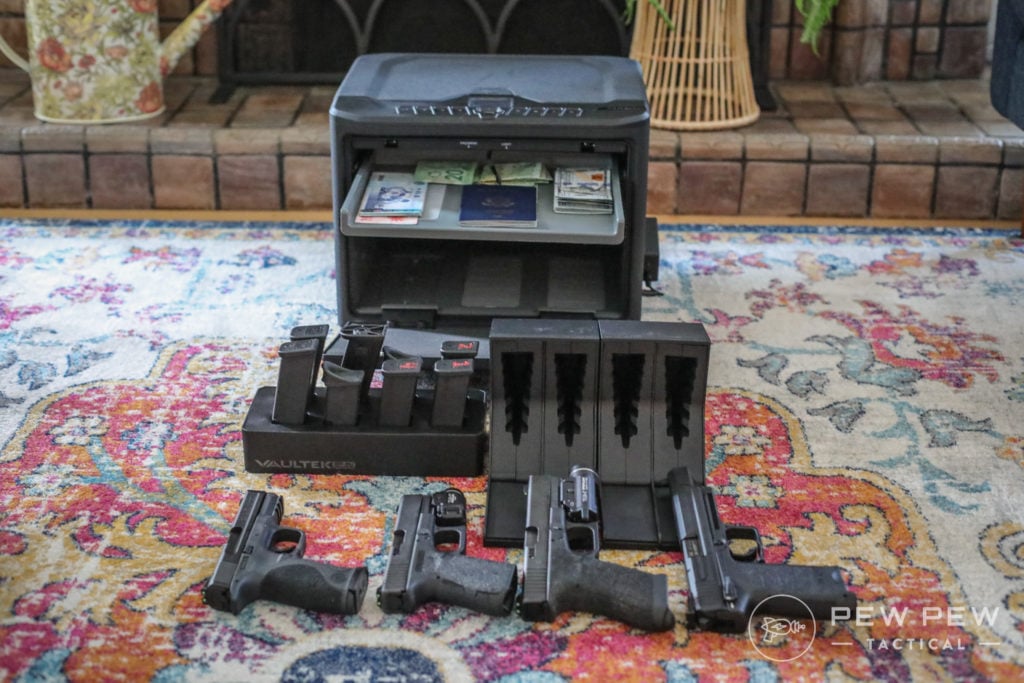
The good news is that there are no requirements on how or where to store your firearms, as long as they are secured, or at least have devices to prevent unauthorized use or discharge.
That means you can put your guns in a nice study safe hidden away in your bedroom closet, like one of our recommended safes, or even in a secret compartment behind that huge American flag painting in your living room.
The sky’s the limit! Or your wallet or whatever.
Now get out there and pew pew! Tactically, of course.
To read up on other laws, check out our State Law Page and CCW Law Page.

